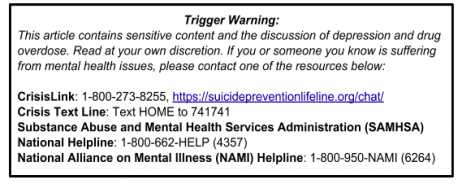Mac Miller: Another casualty
December 13, 2018

Malcolm McCormick died of a suspected drug overdose on September 7, 2018 in Los Angeles, California. He was a 26 year old rapper who amassed a huge amount of success and critical acclaim in a career that ended far too early. He died while suffering from mental health issues, similar to the circumstances surrounding the death of Whitney Houston, also caused by a drug overdose.
As a fan, I think Malcolm would prefer for me to write about him as Mac Miller, or just refer to him simply as Mac. Despite his untimely death, Mac was a fun loving soul, and I found that all of the artists who spoke of him after his passing showed nothing but respect for him and his work.
Rest In Peace to the great soul Mac Miller
— J. Cole (@JColeNC) September 7, 2018
However, Mac suffered from severe depression, and accompanying anxiety throughout his life. The most creative people are often haunted by an inexplicable sadness, and that sadness was reflected in Mac Miller’s music since he was 19 years old. Don’t get me wrong — Mac Miller had a knack for imposing an array of different emotions on his listeners. Whether it be happiness or sadness, or anything in between, you feel something when you listen to his beautiful melodies and meaningful lyrics.
Art, in all of its different forms, is deeply emotional and often tragic. Look at Vincent Van Gogh, or Ernest Hemingway, or Mac Miller himself. These creative minds take all of their hopelessness and despair and place it onto a canvas, paper, or album. But while they get to reap the fame and fortune that comes out of it, they are constantly haunted by their own mind as their work encourages them to dwell on their misfortune.
This experience does not only apply to artists. According to Johns Hopkins Health Review, the odds of adolescents suffering from depression grew by 37 percent between 2005 and 2014. 20 percent of teens experience depression before they reach adulthood, and only 30 percent of them are being treated for it.
To put that into perspective, if there are 786 students enrolled at Mason, then there are 157 students who have experienced, or will experience depression before they turn 18. Of those 157, only 47 have sought or will seek treatment for the disease.
I urge more students to seek help. There is no shame in admitting that you have a condition that you haven’t learned to appropriately address.
Mac had recently had experienced a tragic breakup with singer and actress, Ariana Grande, who he had been dating for two years. His fanbase suspects that she is probably what drove him down such a dark path, but I’m sure that taking care of him became too hard when he refused to take care of himself.
Nevertheless, the rapper turned to drugs and alcohol to mend his pain even if only for a few moments of euphoria. As his substance abuse progressed, he may have started to contemplate a more permanent solution to his melancholy.
“Swimming” was his last album, released about a month before his death. In it, there are some serious red flags regarding his mental health. On the first track of the album “Come Back to Earth”, Mac says: “I just need a way out of my head. I’ll do anything for a way out of my head.” Beyond that, there are numerous other examples from the album depicting his dire mental circumstances.

With that being said, I think his album should serve as a sort of reference for someone to evaluate the mental health of themselves and/or others. If you resonate with his message on a very personal level, maybe consider taking steps in the direction of self improvement. Or, if his lyrics are similar to something your friends or family may have said to you, think about asking them what’s wrong and they might come to the realization that their mood has been so noticeable. Sometimes it’s hard to evaluate yourself when it comes to your state of mind.
If your parents won’t listen, it’s probably because they don’t understand the problem, as it may have never affected them. My suggestion is to be honest; maybe even overwhelmingly so. Once the people who love you hear the truth and see how it is affecting you, they will be more inclined to help.
If your parents are ignorant, then you might be able to handle the problem yourself. Many psychology professionals will allow you to consent to your own mental health treatment at the age of 16. Also, Mason recently hired two new additions to the counseling department – a new psychologist, Sharon Hoffman, and a new social worker, Ghada Khalaf. They are available in the counseling office whenever students feel overwhelmed, and they are there to refer students to further help if needed.
You’re not doing yourself or anyone else any favors by ignoring your feeling, refusing treatment, or keeping the problem to yourself. Those who truly care for you are affected by your moods as well as their own, and your feelings could rub off on them. Do what Mac should have and seek the help you need before turning to the bottle or lighter as a bandaid for a wound too deep.









